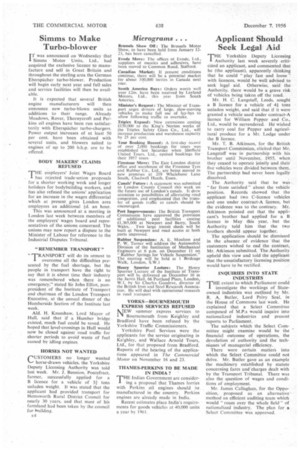Applicant Should Seek Legal Aid
Page 50

If you've noticed an error in this article please click here to report it so we can fix it.
PE Yorkshire Deputy Licensing Authority last week severely criticized an applicant, and commented that he (the applicant), apparently thinking that he could "play fast and loose with licences, would be well advised to seek legal aid. Otherwise, said the Authority, there would be a grave risk of vehicles being taken off the road, Mr. H. C. Langstaff, Leeds, sought a B licence for a vehicle of 41 tons unladen weight, and said that if it were granted a vehicle used under contract-A licence for William Pepper and Co.. Ltd., would be surrendered. He wished to carry coal for Pepper and agricultural produce for a Mr. Lodge under the B licence.
Mr. T. B. Atkinson, for the British Transport Commission, elicited that Mr. Langstaff was in partnership with his brother until November, 1955, when they ceased to operate jointly and their five vehicles were divided between them. The partnership had never been legally dissolved.
The Authority said that he was "far from satisfied" about the vehiele position. Records showed that the applicant had two C-licence vehicles and one under contract-A licence, but the evidence was to the contrary. Mr. Atkinson pointed out that the applicant's brother had applied for a B licence in May this year, • but the Authority told him that the two brothers should appear together.
The application should be dismissed in the absence of evidence that the customers wished to end the contract, Mr. Atkinson submitted. The Authority upheld this view and told the applicant that the unsatisfactory licensing position would have to he rectified.
INQUIRIES INTO STATE INDUSTRIES
THE extent to which Parliament could investigate the workings of Stateowned industries was outlined by Mr. R. A. Butler, Lord Privy Seal, in the House of Commons last week. He explained that a Select Committee composed of M.P.s would inquire into nationalized industries and present -reports to Parliament. The subjects which the Select Committee might examine would be the financial outcome of operations, the devolution of authority and the techniques of managerial efficiency. There were certain matter's into which the Select Committee could not delve. Mr. Butler gave as an example the machinery established by statute concerning fares and'charges dealt with by the Transport Tribunal. There was also the question of wages and conditions of employment. Mr. James Callaghan, for the Opposition, proposed as an alternative method an efficient auditing team which would "roam over the whole field" of nationalized industry. The plan for a Select Committee was approved.




























































































































